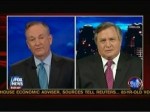Dick Morris Thinks Shutting Down the Government to Repeal Health Care Bill is a Great Idea
Click here to view this media Dick Morris thinks that we should shut down the government if President Obama doesn’t agree to defund the health care law. Even Bill O’Reilly is skeptical of his nonsense. I’d like to know how may homeless people Dick Morris would like to take in after we have economic chaos if either the Congress or the president follow his suggestions here since he apparently has no concern whatsoever for what would happen if the government defaults on its debt. The Conservative Pledge to Freeze the Debt Ceiling Is a Looming Disaster : Led by the advice of Newt Gingrich, the former House Speaker who was the architect of the 1995-96 debt ceiling crisis, many conservatives are clamoring for a repeat of this past episode in recklessness. By law, a statutory limit restricts the total amount of debt the federal government can accumulate. Only Congress can raise this limit. On the heels of the worst recession since the Great Depression, this “debt ceiling” is projected to be reached sometime early next year. Increasingly, conservatives are pledging to vote against any increases to the debt ceiling—even if this means shutting down the federal government. This reckless pledge would have disastrous consequences for the U.S. economy and the global financial markets, and would severely worsen the long-term budget situation to boot. This conservative pledge has historical antecedents. In the fall of 1995, congressional Republicans refused to raise the debt ceiling for a period of about six months, until they reversed course in March 1996 in response to plummeting poll numbers. This original “debt ceiling crisis,” as it’s become known, was extraordinarily costly, roiling the financial markets and forcing two government shutdowns. The consequences of refusing to raise the debt ceiling would be even more costly today, given the precarious state of the U.S. economy and global financial markets, and potentially could be disastrous. Unlike in 1995, when our economic outlook was good, we are currently fighting our way out of the Great Recession and coming off of the worst financial crisis since the 1930s. Nonetheless, led by the advice of Newt Gingrich , the former House Speaker who was the architect of the 1995-96 debt ceiling crisis, many conservatives are clamoring for a repeat of this past episode in recklessness. The budgetary consequences of this conservative pledge would be catastrophic and far-reaching, forcing the immediate cessation of more than 40 percent of all federal government activities (excluding only interest payments on the national debt), including Social Security, military operations in Iraq and Afghanistan, homeland security, Medicare, and unemployment insurance. This would not only threaten the safety and economic security of all Americans, but also have dire impacts for the economy and job growth. In short, the economic consequences of such a large and precipitous drop in spending would be crushing, and almost certainly result in a severe drop in economic growth and employment at a time when we can least afford it. Moreover, such a move could lead to a panic in the international financial markets. Following the 2008 financial crisis, we have seen debt crises hit Ireland, Greece, and Italy, with fears that this could spread further and cause a global economic downturn. The financial markets are on edge today, with U.S. Treasury bonds being the safe haven for most investment capital . Refusing to raise the debt ceiling would recklessly disrupt the sale and purchase of new Treasury bonds, and could potentially cause a run on outstanding Treasurys as well, as investors sought other investments. This could have catastrophic consequences for our economy as well as the economic stability of the rest of the world. Refusing to raise the debt ceiling would also exacerbate the problems with our long-term budget outlook. The budget deficit right now is the result of two distinct sets of changes since 2001, when we last had a budget surplus. First, a series of long-term policies enacted by the Bush administration—most notably the Bush tax cuts of 2001 and 2003, the decision to fight two major wars without raising taxes, and the passage of an unfunded Medicare Part D prescription drug program—created permanent structural budget deficits that will remain with us over the long term unless they are addressed. Second, the poor economy caused a drop in tax receipts alongside higher “countercyclical” spending, such as for unemployment insurance and food stamps. Implementing a debt ceiling freeze ignores the first set of issues and makes the second set of issues worse by forcing a massive multitrillion dollar hit to an already struggling economy and threatening to take us into a second Great Depression. This is hardly responsible policymaking. So let’s delve a little deeper into the consequences of such conservative folly. As we will demonstrate, the results of a replay of 1995 in 2011 would be the height of recklessness for our economy and global financial markets. Much more there so go read the rest. Someone needs to ask Morris to read the report as well.

Link:

Dick Morris Thinks Shutting Down the Government to Repeal Health Care Bill is a Great Idea